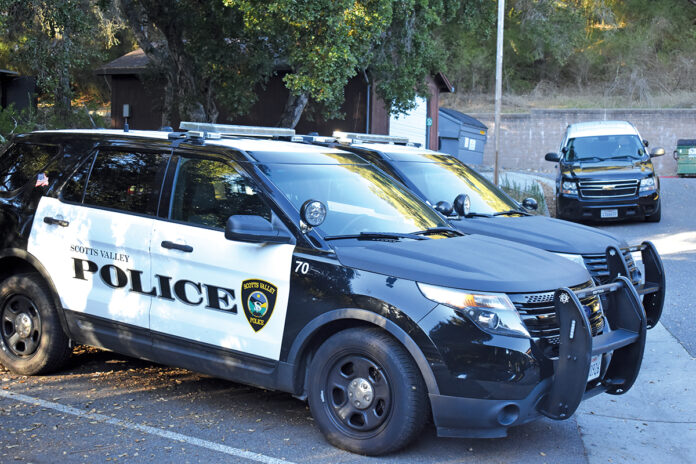
SCOTTS VALLEY—After declaring a fiscal emergency in January and facing unanticipated difficulties due to the pandemic, City of Scotts Valley officials made several budgetary decisions seeking momentary relief. They implemented a hiring freeze, reduced supplies and services and trimmed community services funding, among other things, to save roughly $1.1 million.
Thanks to these measures and additional funding from recently-passed Measure Z, the City’s financial reserve has increased to 30%, 5% over the preferred amount.
Now, City officials are feeling pressure from the Scotts Valley Police Officers’ Association (SVPOA) to increase the police department’s salaries and staffing, which they say are at “critical” levels.
But City Manager Tina Friend says it is too early to roll back budgetary cuts as the pandemic is far from over. She and Mayor Derek Timm also say it is too early to see large returns from Measure Z, which went into effect in July and did not start accumulating funds for the City’s general fund until a couple months ago.
“At this point we are still very cautious,” Friend said. “We’ve weathered a number of openings and closings that have greatly impacted revenue. Fortunately the [City’s] losses weren’t as deep as expected in some revenue categories, but we still have a ton of unknowns.”
Although every department felt the cuts, the position freeze particularly affected Public Works, Community Development and the Scotts Valley Police Department. The City Manager’s Office, Community Development and Administrative Services were most affected by reduced funding for services and supplies. Of all these hardships, Friend said she is most concerned about reductions to staffing.
“We have an extremely skeletal city and our salaries lag the local and regional market,” she said. “We have too many vacancies to provide the level of service our community deserves and we need to bring back positions that have been long vacant, and seriously tackle our recruitment and retention issues. Scotts Valley will always be lean and efficient, but our staffing shortages are reaching critical levels.”
SVPD now operates with nine staff members, according to the SVPOA negotiations team. Typically, SVPD has one sergeant and two officers per patrol team. Going into the new year, current staffing will only allow for one supervisor and one officer per team.
“This creates significant officer safety issues when that officer is tied up outside of the City transporting someone to jail, [a behavioral health unit] mental health facility or Dominican [emergency room],” the negotiating team said to this publication. “With one lone officer left in the City of Scotts Valley, it dramatically impacts our ability to respond to higher urgency calls which mandate a two-officer response (such as domestic violence), as well our general ability to safely and effectively manage all other incoming calls for service for that solo officer.”
Negotiations between the City and SVPOA have been ongoing since March, and SVPD has worked without a contract since July.
Measure Z, a 1 ¼ sales tax, was overwhelmingly approved by voters in March. The measure was a general purpose tax that was marketed as a way to “protect Scotts Valley’s quality of life,” according to the official ballot question, by avoiding significant cuts and supporting city services, “such as local 9-1-1 dispatch and emergency police response; wildfire/emergency preparation; recruiting/retaining experienced police officers; city road, storm drain and parks maintenance; and other general services.”
The SVPOA in a social media post last week said it could no longer “remain silent about the lack of transparency regarding the critical status of your police department.” Along with low salaries (28% less than the next comparable department), its Investigations Unit—consisting of a detective sergeant and two detectives—is currently unstaffed.
“During the past year and a half, we have lost nearly half of our police force, much of whom were our most experienced and tenured officers,” the SVPOA negotiations team said. “The loss of so much institutional knowledge and experience has been a devastating blow to our department… Those of us who remain do so strictly out of complete loyalty to the citizens and a fervent desire to keep providing important services to our community.”
Friend said the City has barely received Measure Z profits, and that the tax, because it pours into the general fund, nearly half of which goes toward SVPD anyway, will eventually go to the police department.
“If you think about the overarching context, it’s been really difficult,” Friend said. “No one could’ve anticipated the pandemic. We thought we were on the road to recovery (after Measure Z passed) and were looking forward to doing great things, but were plunged back into financial uncertainty.”
The City and SVPOA will likely return to the negotiating table in January.
“We are in negotiations and I know that folks wish that things could happen sooner, but we’re all trying to do our best,” Friend said. “We respect what our employees are doing in all departments and hope to come out of this really strong. Recruitment and retention is an issue, for sure, and something we want to address. It’s about financial sustainability. We’re trapped in a really difficult point in time, where macroeconomic forces are crushing things right now, but this is a conversation we look forward to having.”
Timm added in an op-ed to this publication: “No one could have predicted what 2020 had in store for us, and we are following the financial recommendations made by economists and financial analysts… The [SVPD’s] sacrifices this year will not be forgotten. From this tragic year, our City will emerge stronger, and we hope to be able to provide our PD with funding that matches our gratitude.”
Between April and May City officials prepared the budget, expecting anywhere from $1.5-2 million in losses from the previous fiscal year and $1 million loss this year. As funds trickled in, Friend said “sales tax performed better than we thought.”
“Some vectors, like service stations and restaurants were hit really hard. Others over performed, like home improvement,” she said. “Many residents shifted their buying to online sales, and we’re able to capture a portion of that. So we ended the year with a slight positive of sales tax.”
While sales tax performed better than expected, hotel tax, another source of revenue for the City, was much less than their predictions.
“We were projecting a 23% loss last year, and it ended up being 33% less than that,” Friend said. “Ultimately, hotel tax was a $730,000 loss last year….Things are looking like it will be tight, but we’re hoping to get through it.”
The City will provide a mid-year budget overview in February, when city officials might have more economic answers.
“We will be sitting down with [a sales tax] consultant in January to help us understand sales tax collection in July-September,” Friend said.
Those meetings will help officials evaluate budget cuts, such as the hiring freeze.
“By then we will have the vaccine out and millions of Americans vaccinated. It will be a very important milestone for our City,” Friend said.











